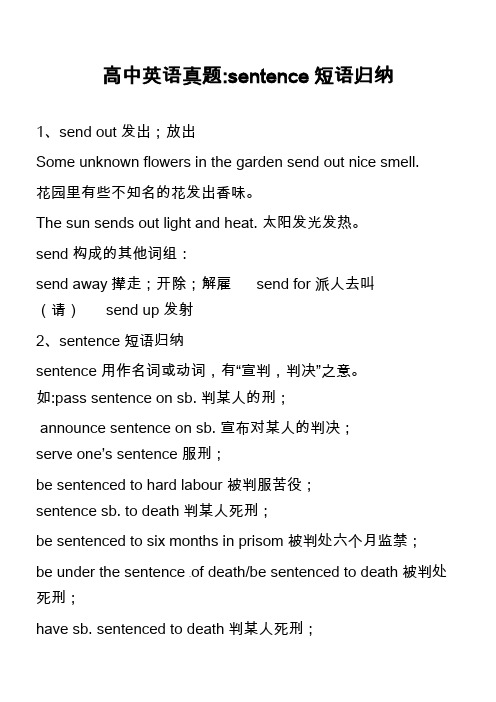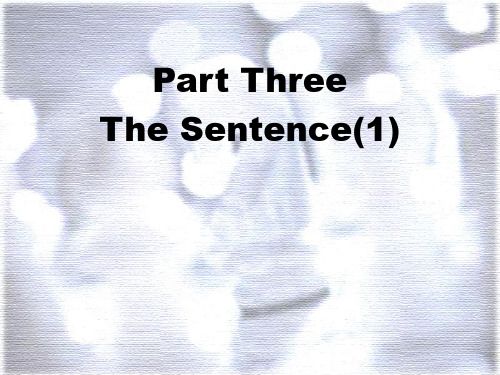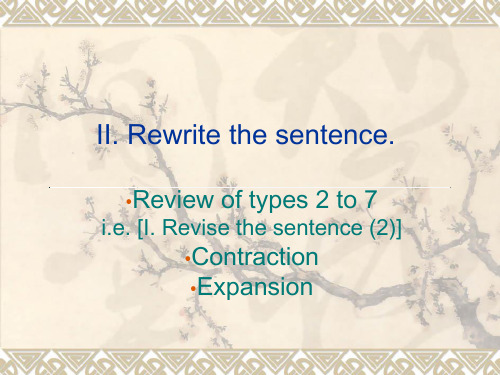The Sentence
- 格式:doc
- 大小:61.50 KB
- 文档页数:5

高中英语真题:sentence短语归纳1、send out 发出;放出Some unknown flowers in the garden send out nice smell.花园里有些不知名的花发出香味。
The sun sends out light and heat. 太阳发光发热。
send 构成的其他词组:send away撵走;开除;解雇 send for 派人去叫(请) send up 发射2、sentence 短语归纳sentence 用作名词或动词,有“宣判,判决”之意。
如:pass sentence on sb. 判某人的刑;announce sentence on sb. 宣布对某人的判决;serve one’s sentence 服刑;be sentenced to hard labour 被判服苦役;sentence sb. to death 判某人死刑;be sentenced to six months in prisom 被判处六个月监禁;be under the sentence of death/be sentenced to death 被判处死刑;have sb. sentenced to death 判某人死刑;receive a sentence of two years 被判两年徒刑。
完成句子①一个凶手被判三年徒刑,另一个被判处死刑。
One murderer was______ ______ three years in prison and the other was sentenced_______ _________ .②那小偷被判5年监禁。
The thief_______a sentence _______ 5 years in prison.Key:①sentenced, to, to, death ②received, of3、separate(1)adj. 独自的、独立的、分别为不同的、各自的、分离的、分开的。


sentences是什么意思_sentences中文翻译_常见例句你知道怎么解释sentences这个单词吗?你会使用该单词造句吗?请阅读以下文章,跟着一起来了解。
sentences是什么意思_sentences中文翻译_常见例句sentences【基本解释】n. 句子;判决vt. 宣判;判决【详细释义】n. (名词)宣判,判决,课刑句子,句主张,意见【数、逻】命题【音】乐句<古>警句,格言,谚语v. (动词)宣判,判决使遭受【常用短语】Key Sentences 重点句子; 关键句; 重点句型; 关键句型Supporting sentences 支持句; 支撑句; 分层次说明理由; 缘由long sentences 长句; 不必要的长句; 长句的翻译; 长句多Compound Sentences 并列句; 复合句; 并列复合句; 复合句Improving Sentences 改进句子; 修改句子; 改进句子题; 句子改进题topic sentences 主题句; 中心句; 分论点; 关键句mandatory sentences 规定刑期; 规定死期Effective Sentences 有效的句子; 句子表达的准确性; 有效句子; 好的句子Common Sentences 常用句式; 惯用句; 常用句式; 常用句型make sentences with 用…造句【常见句型】用作动词(v.)用作及物动词S+~+ n./pron.The criminal had been sentenced.罪犯已被判了徒刑。
No one could understand why the murderer was not sentenced.谁也不理解为什么杀人犯没有被判处徒刑。
用作宾补动词S+~+ n./pron. +to- vThe judge sentenced him to do hard labour.法官宣判他服苦役。


《实用英语语音(二)》复习资料1I. Fill in the blanks.1.An intonation unit usually corresponds to a group .2.The phonetic transcription of the underlined words in the sentence “The present president ofthe committee will present the final report to Parliament soon.” are [ ] and [ ] respectively.3.The frequent occurrence of the syllable is one of the fundamental characteristicsof spoken English,and the one that most distinguishes English from Chinese.4.The syllable which carries a maximal prominence in the tone unit is called .5.Rhythm in English speech is based on .6.According to the manner of articulation,the sound [ p ] and [ t ] are_______consonants while [ m ] and [ n ] are consonants.7.Intonation can be used to convey feelings and attitudes.The__________intonation is said to be more often associated with feelings of hesitation,contrast,reservation or doubt.8.According to the place of articulation,the sound[ θ ]and [ ð ] are.9.Head in an intonation unit extends from the syllable up to the .10.Stressed syllables in English have and clear vowel sounds.11.In spoken English,the phenomenon of joining words together is called .12.Intonation can be used to remove ambiguity of English sentences. This is the ____function of intonation.13.The short vowel sound in unstressed syllables is very often the sound ________,which is themost common of all sounds in English.14.[ tʃ] and [ dʒ] are two English affricates and they differ primarily in terms of_______ .15.When we link the final vowels [ ə: ] and [ ə ] to a following vowel,we should add the [ r ]sound as in “her︶own”,and this sound is called .16.The consonants are made by completely stopping the airflow at some point inthe mouth and then,for most productions,releasing it into the sound that follows.17.The placement of nucleus depends on the information content: the more predictable a word’soccurrence is in a given context,the its information content is.Ⅱ. Multiple Choice1.在下列四个单词用斜杠标出的字母中,有一个与其他部分的读音不同。

英文sentence是什么中文意思英文sentence是什么中文意思英文sentence的`用法虽说简单,不过很多人都会忘记它的中文意思。
一起来看看店铺为大家整理收集了英语sentence具体所指的中文意思吧,欢迎大家阅读!sentence的中文意思英 [sentns] 美 [sntns]名词句子; 宣判及物动词宣判,判决例句1. He received a heavy sentence.他受到很重的刑罚。
2. This is a sentence.这是一个句子。
3. The sentence was ten years in prison.判决是十年徒刑。
4. The structure of the sentence is strange.这个句子的结构很奇怪。
sentence的单语例句1. Illegal business operation carries a maximum jail sentence of up to five years.2. Butt was charged with possession and trafficking of classA drugs, which carries a possible death sentence in Thailand.3. The sentence was handed down by the Hangzhou Intermediate People's Court on Tuesday, according to Xinhua News Agency.4. But that sentence will be doubled if his Quranic recitation classes fail to make him a hafez someone who knows the Quran by heart.5. Murray said he wished to appeal both his conviction and his sentence but so far has not filed formal papers with the California appeals court.6. Manson was initially sentenced to die for his crimes but the sentence was commuted to life in prison after California courts abolished the death penalty.7. The death sentence has drawn criticism from European and human rights officials who oppose capital punishment - regardless of the crime.8. Lewis pleaded guilty to capital murder, allowing a judge to determine her sentence.sentence的词典解释1. 句子A sentence is a group of words which, when they are written down, begin with a capital letter and end with a full stop, question mark, or exclamation mark. Most sentences contain a subject and a verb.2. 判决;宣判;判刑In a law court, a sentence is the punishment that a person receives after they have been found guilty of a crime.e.g. They are already serving prison sentences for their part in the assassination...他们因参与这起刺杀已经开始在监狱服刑了。
1句子的成分和基本句型一、句子的概念The Definition of the Sentence句子是由词按照一定的语法结构组成的,是能表达一个完整概念的语言单位。
二、句子成分The Components of the Sentence概念:组成句子的各个部分。
主要包括:主语、谓语、表语、宾语、宾语补足语、定语和状语。
主语和谓语是句子的主体部分(在英文中一般的句子必须有主语和谓语,祈使句除外)。
1. 主语:是在句子中说明全句中心主题的部分。
一般由名词、名词短语、代词、不定式或动名词来充当。
一般置于主句及从句的句首。
The classroom is very clean.Seeing a film is pleasure while making one is hard work.We study in No. 1 Middle School.To teach them English is my job.注:不定式做主语时,常可用形式主语it句型进行转换,例如上句To teach them English is my job. = It is my job to teach them English.(真正的主语是to teach them English)。
2. 谓语:主要说明主语“做什么”、“是什么”或“怎么样”,即主要描述主语的行为动作,是由动词及动词短语构成。
一般置于主语后。
His parents are doctors.She looks well.We study hard.I have done the job.He can speak English.3. 表语:说明主语“是什么”或者“怎么样”,即主要描述主语的属性及状态。
由名词、形容词、副词、介词短语、不定式及短语来担任。
表语的位置一般在系动词的后面。
2You look younger than before.I am a teacher.Everybody is here.They are at home now.My job is to teach them English.4. 宾语:是动作、行为的对象,由名词、名词短语、代词、不定式或动名词来充当,它和及物动词一起说明主语做什么,通常置于谓语动词之后。
The SentenceI. What is a sentence ?A sentence is a sequence of words that express a complete idea, beginning with a capital letter and ending with a period, a question mark or an exclamation mark. The words forming a sentence must be organized in a certain order to convey ideas clearly and also to avoid ambiguity.(1) I like English.Like I English.English like I.English I like.It is easy for us to see that only the first sentence among the four is acceptable according to English grammar. The other three sentences can just be regarded as word-groups that cannot clearly show what they mean owing to word-order fault.(2) Jim loves Alice.Alice loves Jim.Although the two given sentences are correct in grammatical terms, they differ slightly in their meanings. In the first sentence, “Jim” is the subject of the verb “love”, while “Alice” is the subject of the verb “love”in the second sentence, so accurately, we cannot know whether the object in each sentence also loves the other person.Besides, a grammatically acceptable sentence contains at least a subject and a predicate verb, though in many cases, other sentential elements are added to make the sentence more expressive. It is of rather great help to study what elements a sentence can contain and how those elements can be placed in suitable ways to form different types of sentences in English language learning.II. Classification of sentencesSentences can be divided into different classes from different perspectives, which will be further manifested as follows.2.1 From the perspective of functionAccording to function, we have declarative, interrogative, imperative, exclamatory and optative sentences. Undoubtedly, the five types of sentences are used to help speakers or writers achieve their different purposes in language use.A declarative sentence provides a statement, either affirmative or negative. What’s noteworthy is that a negative sentence must contain a negative or semi-negative word (no, not, never, nothing, hardly, few, etc).(3) A light heart lives long. — William Shakespeare (an affirmative sentence)(豁达者长寿。
)The maternal love never changes. (a negative sentence)(母爱永恒。
)An interrogative sentence is used to raise a question, which can be further classified into five sub-categories, namely, simple question, special question, alternative question, disjunctive question, and rhetorical question. A simple question begins with an auxiliary verb, a modal verb, or the verb “be”, and in most cases calls for a “yes” or a “no” as its answer. For this reason, a simple question can also be called a yes-no question.(4) Does it matter who can be elected Chairman of the Student Union?(谁会被选为学生会主席重要吗?)Can diligence alone always lead to success?(仅仅勤奋能成功吗?)Is it necessary for students of English to read some western literary works?(英语专业的学生有必要读一些西方文学作品吗?)A special question, or a wh-question, as the term itself implies, begins with a wh-word, in other words, an interrogative pronoun (who, whom, whose, what, which) or an interrogative adverb (when, where, why, how). We should not forget that the word “how” is generally believed to be a wh-word, notwithstanding its different initial letters. And questions of this type often require specific answers.(5) What do you suppose are the main causes of global warming?(你认为全球变暖的主要原因何在?)Why are so many teenagers addicted to Internet games?(为什么如此多的青少年对网络游戏上瘾呢?)An alternative question, or a question of choice, provides us with two or more choices, which are connected by the coordinating conjunction “or”.(6) Should college students read extensively or selectively?(大学生应该精读还是泛读?)Does e-mail make people get closer or drift apart?(电邮是把人们拉近了还是疏远了?)What is the most popular sport among teenagers, basketball, football, or swimming?(青少年当中最受欢迎的运动项目是什么,篮球、足球、还是游泳?)A disjunctive question, or a tag question, means a short question following a statement. Generally speaking, an affirmative statement precedes a negative short question, while a negative statement is followed by an affirmative short question.(7) The Internet has become the chief source of information, hasn’t it?(因特网已成为主要的信息来源,不是吗?)E-friends can never take the place of our real-life friends, can they?(网友决不能够取代现实生活中的朋友,是吗?)A rhetorical question is one that is asked to make a point rather than to expect an answer. It is often regarded as a figure of speech in the form a question, which is more emphatic than an ordinary statement. We should also notice that this type of questions can end with a period, an exclamation mark, as well as a question mark.(8) What can prevent us from making greater progress if we persevere with our work?(=Nothing can prevent us from making greater progress if we persevere with our work.)(如果我们坚持工作,谁能够阻止我们取得更大的进步呢?)This is my kingdom. If I don’t fight for it, who will?(这是我的王国,为之奋战,舍我其谁?)Why should I believe you, a guy who never tells the truth?(我为什么应该相信你这么一个从不说实话的家伙?)By using imperative sentences, the speaker intends to give advice, instructions, requests, or commands. Despite some few exceptions, a bare infinitive or the auxiliary verb “do” combined with “not”is often required to be placed at the beginning of an imperative sentence, which is believed to have an implied second-person subject in most cases.(9) Pursue breakthroughs in your life. (在生活中寻求突破。